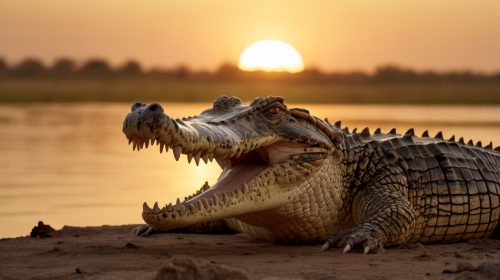
The Nile crocodile (Crocodylus niloticus) is a formidable apex predator inhabiting freshwater habitats across sub-Saharan Africa. Renowned for its size, aggression, and adaptability, the Nile crocodile holds a prominent place in both ecological and cultural landscapes. Its distinctive appearance, behavior, and ecological role make it a species of significant interest and concern.
Nile crocodiles are among the largest crocodilian species globally, with mature adults reaching lengths of up to 16 to 20 feet (4.8 to 6 meters) and weighing over 1,500 pounds (680 kilograms). They possess robust, armored bodies covered in thick scales, which provide protection and aid in thermoregulation. Their powerful jaws are lined with sharp teeth designed for seizing and crushing prey.
These crocodiles are highly adapted to aquatic life, inhabiting rivers, lakes, swamps, and estuaries throughout their range. They are opportunistic predators, preying on a wide variety of animals including fish, amphibians, birds, mammals, and occasionally larger prey such as zebras or young hippos. Their hunting prowess is aided by their ability to remain submerged for extended periods and their stealthy ambush tactics.
Socially, Nile crocodiles exhibit territorial behaviors, with dominant individuals often claiming prime sunbathing spots and nesting areas. They are also known for their distinctive courtship displays, typically performed during the breeding season, which involves vocalizations, posturing, and physical interactions between males and females.
Despite their fearsome reputation, Nile crocodiles play a crucial role in their ecosystems by controlling prey populations and scavenging carrion, thereby contributing to nutrient cycling. However, they face numerous threats including habitat loss, human-wildlife conflict, and illegal hunting for their valuable hides and meat. Conservation efforts aim to mitigate these threats and ensure the continued survival of this iconic species.
In summary, the Nile crocodile stands as a symbol of ancient reptilian lineage, ecological importance, and the delicate balance between human activities and wildlife conservation in Africa’s freshwater ecosystems. Understanding and conserving these remarkable predators is essential not only for their own survival but also for the health and biodiversity of their habitats.
- More resources:
![]()